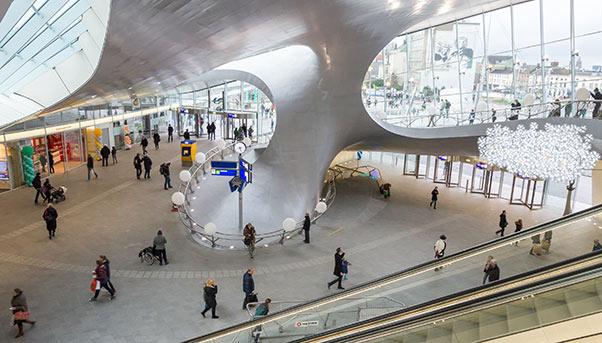
In order to overcome its political and economic impasse, Europe must become more united and confront its debt problem in order to return to invest in strategic infrastructure. It is an imperative that might be heeded by France’s new reformist president, Emmanuel Macron, according to Ludovic Subran. Otherwise, the region risks growing at a pace that is slower than its full potential.
After his and his party’s electoral victories, what kind of Europe does Marcon face?
«A continent that has delegated many of its decisions – including even political ones - to the European Central Bank. It has done it to such an extent that the ECB’s monetary policy today is more redistributive of wealth than that of individual states. Faced with a technocratic Europe managed out of Brussels, the ECB has had to do more than what is stipulated by its mandate in order to help countries and consumers. The problem now is to find political leadership for a Europe than seems irrevocably divided between those countries that drink beer (in the north) and those countries that drink wine (in the south).
The French elections have shown that young people want a Europe with more soul, one that offers a different future, a change in perspective and generates more confidence. Macron faces a lot of expectations to have France contribute to a Europe of projects rather than rules. It is a tough challenge because Europe seems more divided today than ever before and with big problems to deal with like youth unemployment and the division between countries with very low debt and those with very high debt».
Macron’s victory – the most recent being the outcome of the parliamentary election - seems to have strengthened the Franco-German axis. What should we expect in terms of investment?
«On the subject of investment there is a debate going on, especially about Germany’s enormous trade surplus. Some see this surplus as stagnant wealth, a deficit of investment, while others are convinced that it is a reserve to keep, something that should not be used up. The result is that Germany has an enormous investment gap, both private and public. Salaries are too low and there needs to be a redistribution, but it is a very difficult debate to deal with because the German government and part of public opinion do not want to use up this protection that is represented by the surplus. This view has a negative impact on exports from other European countries, on ECB monetary policy. Germany’s growth remains very low without productivity or innovation and, what’s more, it is a drag on the development of other countries in the eurozone».
What trends to you see in the global economy in 2017 and 2018?
«Our forecasts indicate a global GDP growing by 2.9% in 2017 and 2018. The United States is not doing great because even though the election of Donald Trump has woken up the U.S. economy from its lethargy, the risks are still high. The country’s GDP should grow by 2.3% this year against 1.7% in the eurozone and 6.3% in China. But if the United States does not get its economy going, it will be nearly impossible that the world economy returns to growth rates of more than 3%».
What effect will protectionist policies announced by many countries have?
«The chatter about protectionism in global trade is just that: chatter. Protectionism exists and will always exist. What’s more serious is isolationism, which is a political rather than an economic phenomenon. If the United States follows through with its vow to make life difficult for foreign multinationals looking to enter its market, then there will be a problem for Europe’s economy. For the moment, President Trump’s policies seemed designed to create a positive effect for U.S. companies abroad and not to block foreign ones from entering the United States».

One of Trump’s biggest announcements is to invest $1 trillion in infrastructure. What is the position of Europe’s main leaders? Is Europe ready to follow suit?
«Europe already has it infrastructure plan in the form of the Juncker Plan. There had been talk of dedicating a minimum level of GDP to infrastructure spending but, in times of austerity, it seemed like an impossible idea to pursue. So, for now, Europe only has the Juncker Plan, while Asia’s response to Trump has been the Asian Infrastructure Investment Bank and the “One Belt, One Road” initiative launched by China.
Compared with the United States and China, the problem with our plan is that it is weak. It is miniscule. There is a platform but not enough resources. What’s more, at the bureaucratic level, we take too much time to agree. We have so many diverging goals and, in the end, the solution ends up being a mishmash of everything. It does not inspire the kind of change or confidence that is seen in other plans launched by countries elsewhere».
There has recently been some debate over the Juncker Plan. It is being criticized for not channeling the investments initially promised. Is this true?
«The question looming over the Juncker Plan concerns Europe’s commitment to making investments. This applies as much to governments as it does to private investors. On the continent, we are all obsessing over debt and investors do not want to revisit the nightmare of Greece. There are public-private partnerships but nobody wants to take on new debt. What’s more, there is an asymmetry of investment among various European countries. In France, for example, the European Investment Bank has started a number of projects with the Groupe Caisse des Dépôts, while in Italy this type of collaboration has never led to any satisfactory results. So there are few small- and medium-sized Italian companies that have benefited from European investment. There has not been a very strong accelerating factor. We have missed big and ambitious projects even in infrastructure like those that marked the 1990s because there is fear that projects will cost a lot. Simply put, the plan’s potential has not been used».
European has been working for years on a transnational network, the so-called TEN-T. How far are we on this project and what impact will it have on infrastructure?
«The TEN-T is very interesting but it is not enough because the projects are broken up and limited in number. And it is always very difficult to take a shared decision among states involved in the same project».
Many countries, especially Spain, call for the issue of a Eurobond. Could it be useful for the development of the continent? Macron has already said it is not a priority.
«Macron has said we should not look to the past but to the future. The problem is recovering the Greek public debt and soon that of Portugal and Italy. That’s why the investment gap can’t be breached. The fear of debt is strong and lots of companies are not going into debt because of fear of being caught in a country at risk. The Eurobond can be useful to raise liquidity but it will not change the reputational risk of the continent, which is at the core of our problems. The only possible solution is trust».
Looking to the future, what will Macron’s France be like?
«For France, 2017 is set to be a year of big changes and you can feel that sense of fervor that is similar to that of the 1990s in Gerhard Schroder’s Germany and Tony Blair’s Britain. That’s because the new president has confirmed his intention to make the reforms that had not been done in the last seven years, to make France more competitive and attractive. He wants to review the labor market, the social security system, encourage competition and lower corporate taxes. This a programme to free up the country’s energy. But if these reforms are not shared by all the European countries that need them, there will always be someone who will pay for it in the end».


